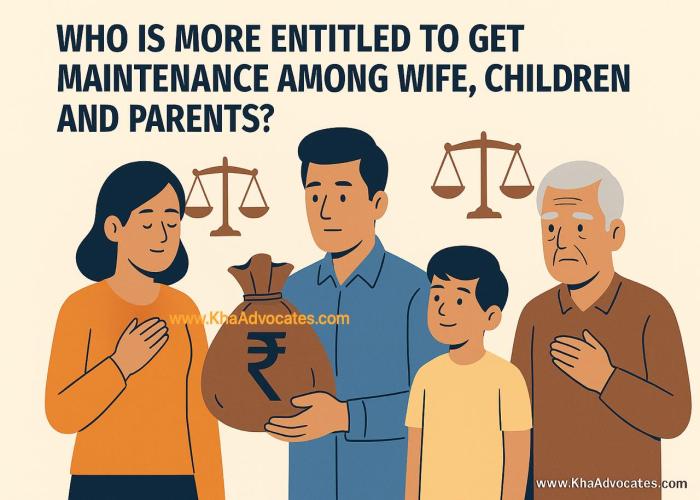
Published on: May 26, 2025
Introduction:
Maintenance is a crucial aspect of family law in India, designed to ensure that dependents are not left destitute. The question often arises: who is more entitled to receive maintenance — wife, children, or parents? With increasing family disputes and litigation, understanding the legal priority and eligibility under Section 125 of the Criminal Procedure Code (CrPC) becomes essential.
This article explores the law, Supreme Court rulings, and case analyses to explain the legal framework and entitlement hierarchy.
Section 125 CrPC provides that a person having sufficient means is liable to maintain:
His wife (who is unable to maintain herself)
His legitimate or illegitimate minor child
His legitimate or illegitimate child (adult) if they are unable to maintain due to physical/mental infirmity
His father or mother if they are unable to maintain themselves
This provision is gender-neutral regarding children and parents but specifies “wife,” making the husband liable.
The CrPC does not explicitly lay down a hierarchy in terms of entitlement. However, judicial interpretations and principles of “urgency of need” and dependency are used to determine priorities.
Let us now examine how courts have addressed this question.
Legal Basis:
Section 125 CrPC + Personal laws (Hindu Marriage Act, 1955 – Section 24 and 25)
In Chaturbhuj v. Sita Bai (2008) 2 SCC 316, the Court held that even if the wife is capable of earning but does not actually earn, she is entitled to maintenance if she cannot sustain herself.
In Rajnesh v. Neha (2020) 12 SCC 285, the Supreme Court emphasized:
“Maintenance is not charity. A wife is entitled to live in a similar standard as her husband.”
The Court also directed uniform maintenance guidelines to avoid multiplicity of litigation.
Wife’s right is prioritized based on dependency and subsistence, especially if minor children are also with her.
Section 125 CrPC (minor or disabled child — regardless of gender)
In Bhuwan Mohan Singh v. Meena & Ors (2015) 6 SCC 353, the Court strongly upheld the child’s right to maintenance, stating:
“No father can abdicate responsibility of providing maintenance to his child under the garb of poverty.”
In case of custody with the mother, courts award interim maintenance to both mother and child jointly.
Minor children’s needs take moral and legal priority, especially for education and health expenses.
Section 125 CrPC + Maintenance and Welfare of Parents and Senior Citizens Act, 2007
Supreme Court View:
In Kirtikumar Maheshankar Joshi v. Pradipkumar Karunashankar Joshi (1992) 1 SCC 179, the Supreme Court observed:
“A son cannot escape liability to maintain aged parents merely because he is married or has a family.”
Also, in Manju Tiwari v. Rajendra Tiwari, the Court held:
“Children have an obligation to maintain aged parents and failing that, courts can enforce the obligation.”
Parents must show inability to maintain themselves and that the child has sufficient means.
Although no statutory ranking exists, courts often evaluate:
Urgency of need (e.g., minor child’s education, medical needs)
Total dependency
Lack of alternate support
In Shailja & Anr v. Khobbanna (2017) 9 SCC 62, the Court noted:
“The primary objective of Section 125 CrPC is to prevent vagrancy and destitution, and hence maintenance must be awarded with humanitarian consideration.”
If a husband hides income or denies maintenance:
File an application under Section 125 CrPC
Seek interim relief
File for execution of maintenance order
If parents or children are neglected, they may approach the Maintenance Tribunal under MWPSC Act, 2007.
If a wife is harassed, she may also claim residence and protection under DV Act, 2005.
✅ A divorced wife without remarriage is entitled to maintenance under CrPC, even if maintenance was rejected under personal law – Rohtash Singh v. Ramendri (2000) 3 SCC 180.
✅ An unemployed adult daughter with disability can claim maintenance – Rambhau v. Rekha AIR 2016 Bom 200.
✅ Father neglected by his son, a government employee, got maintenance enforced via garnishee orders.
The right to maintenance is not a privilege — it’s a legal obligation. The courts prioritize necessity, dependency, and fairness over status. While minor children often receive top consideration, wives and dependent parents also enjoy strong legal protection.
At KHA Advocates, we specialize in family law litigation including:
Filing and defending maintenance claims
Representing wives, parents, and children under CrPC and personal laws
Enforcement of maintenance orders
Expert counsel in cross-jurisdictional NRI maintenance cases
Need expert legal help to claim or defend maintenance?
📞 Contact KHA Advocates today to schedule a consultation.
